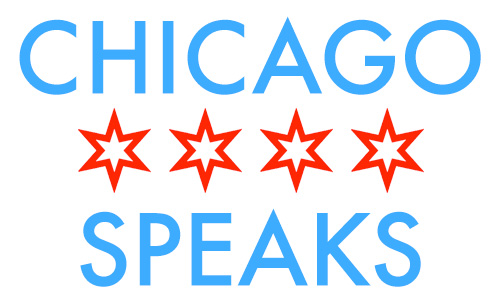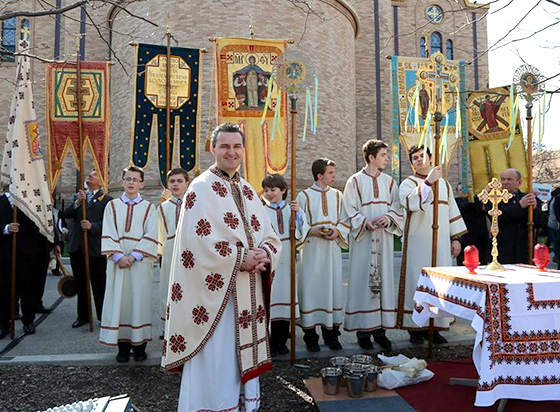| « Family Photography, Appropriation and Respect: Final Week | Postcards from the Mess: Max Morris » |
Chicago Speaks Mon May 19 2014
Chicago Speaks: Ukrainian, as Spoken by Ukrainian Catholic Priest Ihor Koshyk
 As a global city, Chicago is home to many languages besides English. Chicago Speaks profiles speakers of these languages, and shares some of their personal stories along the way.
As a global city, Chicago is home to many languages besides English. Chicago Speaks profiles speakers of these languages, and shares some of their personal stories along the way.
Twenty-nine minutes into my interview with Ihor Koshyk, a priest at Saints Volodymyr and Olha Ukrainian Catholic Church in West Town, I asked him a question about "the Ukraine."
I had learned -- too recently to master my reflex -- that the English speaker's tendency to insert "the" before "Ukraine" was factually and politically incorrect.
So when I heard the definite article coming out of my mouth, I stopped, rephrased and hoped Koshyk hadn't noticed my slip-up. He had, of course. About 45 minutes later, as we prepared to go our separate ways, he mentioned it. "But you caught yourself," he said genially.
Just before that, he had been explaining other things Americans tend to get wrong when confronted with Ukrainian: People turn the name Olha (as in Saints Volodymyr and Olha) into Olga, and Koshyk sometimes gets called Igor instead of Ihor -- Olga and Igor being the Russian versions of the names in question.
Russian, he notes, doesn't have an "h" sound, as Ukrainian does. But the two Slavic languages are closely related, and both are widely spoken in Ukraine.
While Ukrainian is the official national language, millions of Ukrainians consider Russian their native language and in many places Russian is the most common means of everyday communication. Lviv, Koshyk's hometown, is not one of those places. It's located in the western part of the country, where Ukrainian is generally dominant.
Ukrainian in Chicago
In Illinois, there are about 12,000 people who speak Ukrainian at home, according to the U.S. Census Bureau's 2006-2008 American Community Survey. About 46,000 Chicago area residents claim Ukrainian ancestry.
Ukrainian Chicagoans live all over the city and suburbs. But Koshyk says Ukrainian Village, where Ukrainian immigrants began settling in the late 19th century, remains a gathering place. Many of his parishioners come in from the suburbs to attend services at Saints Volodymyr and Olha, where services are in Ukrainian.
"I am always speaking Ukrainian," Koshyk says. "With my wife, with my children, with my parishioners, with the other priests." (The Ukrainian Catholic Church, unlike the Roman Catholic Church, allows priests to marry.) He even takes his children to Ukrainian-speaking doctors and dentists.

Father Ihor Koshyk of Saints Volodymyr and Olha Ukrainian Catholic Church.
Photo by Halyna Uhryn.
Something Really Deep in Common
Koshyk, who is 37 and has lived in Chicago since 2002, does not surround himself with other Ukrainian speakers because of any discomfort with English. He speaks it so well that when he went to visit a Ukrainian Catholic parish in Los Angeles, people there told him he had a Chicago accent. For seven years, he has worked a second job as a chaplain at Saints Mary and Elizabeth Medical Center, in part as a means of keeping his English "sufficient." (To my ears, it's more than that.)
But the Ukrainian language is important to the community he serves and something he's intent on imparting to his Chicago-born children, now 2 and 5 years old. It can be challenging, he says, to enforce another language at home once children become immersed in the English-speaking world outside. Some of his parishioners, though, have managed to pass along Ukrainian through multiple American-born generations.
"Among the Ukrainians especially, language is the key to preserve the culture and tradition," he says. "[When] people don't speak the language anymore and try to translate things into English [to] celebrate different feasts or live different traditions... it kind of loses the sense a little bit. When you speak the language, when you know the language, you have something really deep in common."
How Do You Translate Borscht?
When asked what words and phrases are the hardest to translate into English, Koshyk cites jokes and culturally specific dishes. To understand what he means, think of a French person translating crêpe as "pancake." Or just listen to Koshyk's example, another dish that brought its name with it into English:
"Borsch," he says, using the Ukrainian pronunciation (the final "t" we use in English comes by way of Yiddish). "It's a borsch. What is a borsch? Beet soup. But how do you translate borsch into one word? No, there's no way. It's a beet soup. It's a soup with beet. It's borsch."








